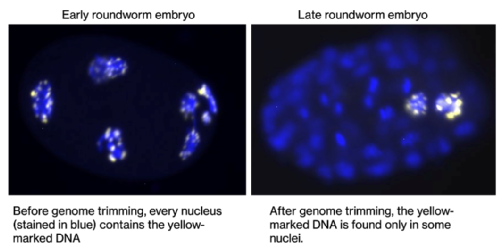Reviewed by Danielle Ellis, B.Sc.Nov 10 2023
A new study is in progress to unravel a fascinating biological mystery of how certain animals can naturally eliminate more than half of their genetic information during embryonic development.

Image Credit: University of Warwick
For more than 130 years, scientists have been captivated by this radical natural phenomenon, posing an alluring question within the realms of developmental biology and genetics.
Utilizing cutting-edge genetic engineering tools, the research team at The University of Warwick is actively engaged in unraveling the mechanisms responsible for this selective genomic editing. By uncovering the mechanisms that enable certain nematode worms to discard up to 60% of the genetic material in some cells, the researchers aspire to create biotechnological tools capable of facilitating large-scale, precise genomic alterations.
These tools could find application in various domains, ranging from engineering models of hereditary diseases to advanced medical research and treatments, thus enhancing crop resilience to challenging environmental conditions in the agricultural industry.
This latest study is part of the Biotechnology and Biological Sciences Research Council’s (BBSRC) Pioneer Awards, representing a potential revolution in the comprehension of the fundamental principles governing life.
Sixty-two researchers distributed across the UK, including Professor Andre Pires da Silva at the University of Warwick, are slated to receive portions of a £12 million fund. This financial support aims to facilitate visionary bioscience research that has the potential to advance human understanding of life's underlying principles significantly.

Image Credit: vchal/Shutterstock.com
By embracing unconventional thinking and approaches, the researchers aspire to make groundbreaking discoveries that could revolutionize human understanding of the fundamental rules governing life. These innovative investigations seek to fundamentally alter the way humans conceptualize crucial biological phenomena across plant, microbial, and animal sciences.
The financial support provided by the Biotechnology and Biological Sciences Research Council’s (BBSRC) Pioneer Awards empowers the pursuit of unique ideas that challenge prevailing thoughts and paradigms or introduce entirely new realms of exploration.
Funding opportunities for curiosity-driven studies have led to several important discoveries with practical applications. This includes the development of the polymerase chain reaction (PCR) technique, which is now widely used in biomedical research for amplifying DNA. The BBSRC is giving us a tremendous chance to explore a unique way of genome regulation, which may also help in building new tools to help areas such as medicine and agriculture.”
Andre Pires da Silva, Professor, School of Life Sciences, University of Warwick
“Understanding the fundamental rules of life, such as the principles governing genetics, evolution, and biological processes, is essential for advancing scientific knowledge. It is also imperative to societal progress,” says Guy Poppy.
Many of the challenges faced by today's society, such as global food security, environmental sustainability, and healthcare, are deeply rooted in biological processes. BBSRC is committed to understanding the rules of life and by investing in cutting-edge discovery research through schemes such as the Pioneer Awards pilot, we are expanding the horizons of human knowledge while helping to unlock innovative bio-based solutions to some of the world's most pressing challenges.”
Guy Poppy, Professor, Interim Executive Chair, BBSRC